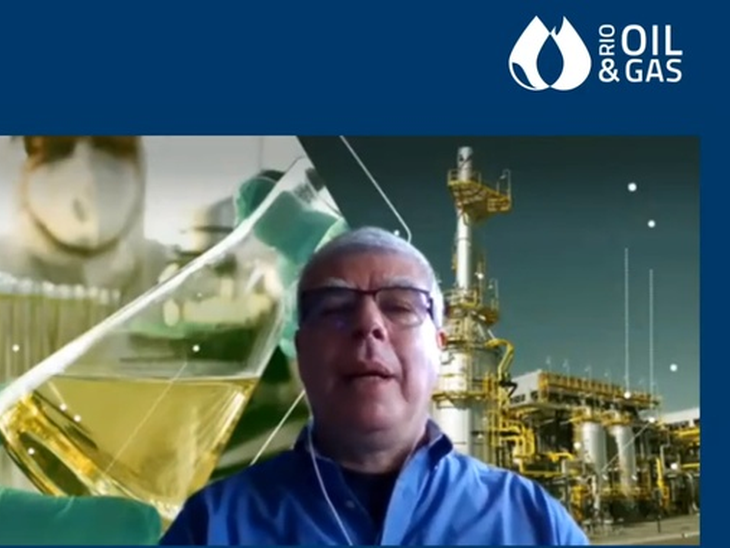
 Biofuels
Biofuels
T&B Petroleum/Petrobras Agency

Petrobras senior consultant Ricardo Pinto (photo) participated, this Thursday (10/22), in a webinar on “The importance of biofuels in the energy transition of the transport matrix”, promoted by the Brazilian Petroleum Institute (IBP). At the event, Ricardo Pinto highlighted the importance of introducing renewable diesel in the biofuel matrix in Brazil. Renewable diesel is a modern biofuel, made with raw materials such as vegetable oils, animal fat and even used cooking oil, which can be mixed with petroleum-derived diesel.
“Renewable diesel is used in a mixture with diesel oil and can be produced directly via diesel oil coprocessing with renewable raw materials in hydrotreating units at oil refineries. Coprocessing is the quickest way to start production and at less cost, as it uses existing infrastructure. Diesel can now leave the refinery as a Diesel R5, for example, with 5% renewable content. Ester biodiesel could be used together, in a portion, for example, of 7%, in the same mandate of biofuels added to petroleum diesel, reaching the same levels (12%) of renewable content that currently exist in the diesel sold at the service stations.In some uses, such as emergency generators or thermal plants, where product stability is a key factor, the use of a Diesel R12 would be much more suitable. Hydrotreated renewable diesel (HVO) is the fastest growing biofuel in the world and is already widely adopted in other regions such as Europe and the United States. About 15% of HVO production is done by co-processing with mineral diesel oil at oil refineries ”, said Ricardo Pinto.
The Petrobras specialist also highlighted the importance of competition in the segment of biofuels mixed with diesel, a market currently occupied exclusively by ester-based biodiesel. This would be achieved by including renewable diesel in the mandate today occupied exclusively by biodiesel ester. The presence of several biofuels in the same mandate is already permitted by Brazilian legislation, but it still depends on regulation by the National Agency of Petroleum and Natural Gas and Biofuels, and would allow more competition in the sector, bringing cost and quality benefits to the final consumer. Currently, the adoption of renewable diesel is being studied by authorities such as ANP and the National Energy Policy Council.
Renewable diesel has several advantages over ester biodiesel, the only biofuel that can currently be mixed with petroleum diesel in Brazil. Renewable diesel is capable of reducing greenhouse gas emissions by 70%, when compared to regular diesel, and by 15% when compared to biodiesel. This is because the biodiesel ester uses methanol, a product of fossil origin, in its production process.
Unlike ester biodiesel, renewable diesel does not have metallic compounds in its composition that impair the functioning of the flue gas treatment systems present in vehicles. These metallic compounds, found in biodiesel ester, deactivate catalysts that reduce pollutant emissions from flue gases, causing particulate material and nitrogen oxides to be released into the environment, directly linked to health problems. The use of HVO allows the service to RenovaBio and also to the P8 phase of PROCONVE (Air Pollution Control Program by Motor Vehicles).
Renewable diesel also allows the use of residual raw materials, such as used cooking oil, further contributing to the decarbonization of the atmosphere.
Another advantage of the new biofuel is that, although it is made from renewable raw material, the product is chemically the same as petroleum diesel. This means that it is a highly stable fuel, both thermal and storage. Ester biodiesel, on the contrary, has glycerins in its composition, which can cause clogging in storage systems and filters, pumps and injectors, impairing the performance of vehicles.
The event also included the presence of Valéria Lima, executive director of IBP's downstream, Heloisa Esteves, director of Petroleum, Natural Gas and Biofuels Studies at EPE, Paulo Jorge Santo Antônio, deputy coordinator of Anfavea's Technical Affairs Committee, and Vânya Pasa, coordinator of the UFMG Fuel Laboratory. All participants highlighted the importance of introducing renewable diesel as soon as possible into the Brazilian energy matrix as a way to improve the quality of the biofuel used in the country.
BIOQAV
The speakers present at the event also recalled the need to introduce bioQAV in the Brazilian energy matrix. The International Civil Aviation Organization (ICAO) has created a program for the reduction of greenhouse gases by aircraft. ICAO mandates that all member countries, including Brazil, use aviation biofuels as of 2027. It was also noted that ANP Resolution 778 includes all types of bioQAV, regardless of process and / or composition, ensuring competition between they. Petrobras considers that the production of bioQAV is associated with the production of renewable diesel and the introduction of the two biofuels in the Brazilian energy matrix is very important and needs to be carried out urgently.

Contact us